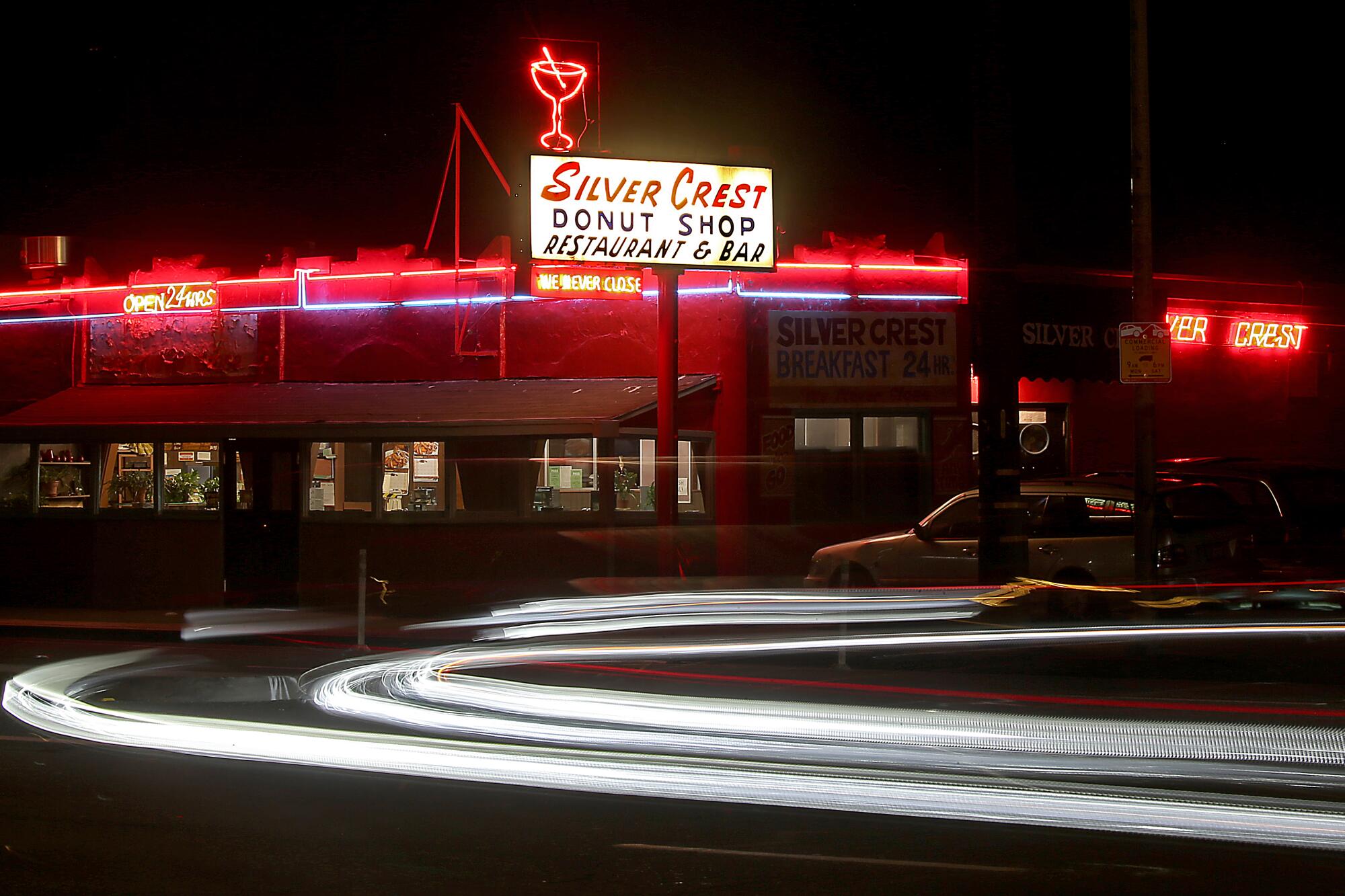
- Share via
It’s midnight at the Silver Crest Donut Shop in San Francisco and there are no doughnuts, though people keep coming in to ask for them.
The honey buns, glazed rings and jelly-filled classics have been gone since August, when owner George Giavris hurt his back and ended up in a wheelchair. And before the doughnuts came off the restaurant’s menu, it was the chili burgers, fish sandwich and cold cuts. Then they had to close the men’s bathroom. Since George got hurt, there’s no cook for dinner service.
But the Silver Crest remains open 24 hours a day, every day, as it has since George and his wife, Nina, got the keys in 1970. It’ll never close, George insists. Not for his back pain, nor that in his arms, legs and neck.
Health issues aside, staying open is a bigger challenge than ever before. In California especially, 24-hour restaurants are becoming an endangered species. Even 7-11 franchisees have requested that the chain drop the requirement to be open all the time, although it’s unclear whether any of the convenience stores will be allowed to adjust their hours.
It’s inevitable that brick-and-mortar businesses of all types will suffer as more transactions are captured by apps and delivery services. But beyond the rise of e-commerce, a growing demand for experiences over products is reshaping the fabric of neighborhoods. Our blocks are full of pop-ups, seasonal markets, retail residencies and other attempts to make our neighborhoods as entertaining and ephemeral as our news feeds.
For a lot of places, permanence is no longer a part of the business model. But permanence is the Silver Crest’s specialty.
The restaurant didn’t close when the garment manufacturing business left the Apparel City neighborhood in the 1970s, taking the lunch traffic with it. Nor when freeway modernization stranded the Silver Crest amid a cursive tangle of off-ramps, gas stations and drive-throughs. Not for the pandemic nor its slow, uncertain aftermath.
No one is quite sure why George, 84, won’t retire. Whenever I ask, he keeps answering by telling me to read the sign outside: “We never close.”
He isn’t interested in discussing the business model. All he will say is that it’s important to keep your promises, and that if my grandpa were alive, he could probably explain it to me.
His niece Pamela Rekas observes this exchange with poorly disguised amusement and motions toward the plate of breakfast food on the table.
“Eat your potatoes,” she says. “They’re getting cold.”
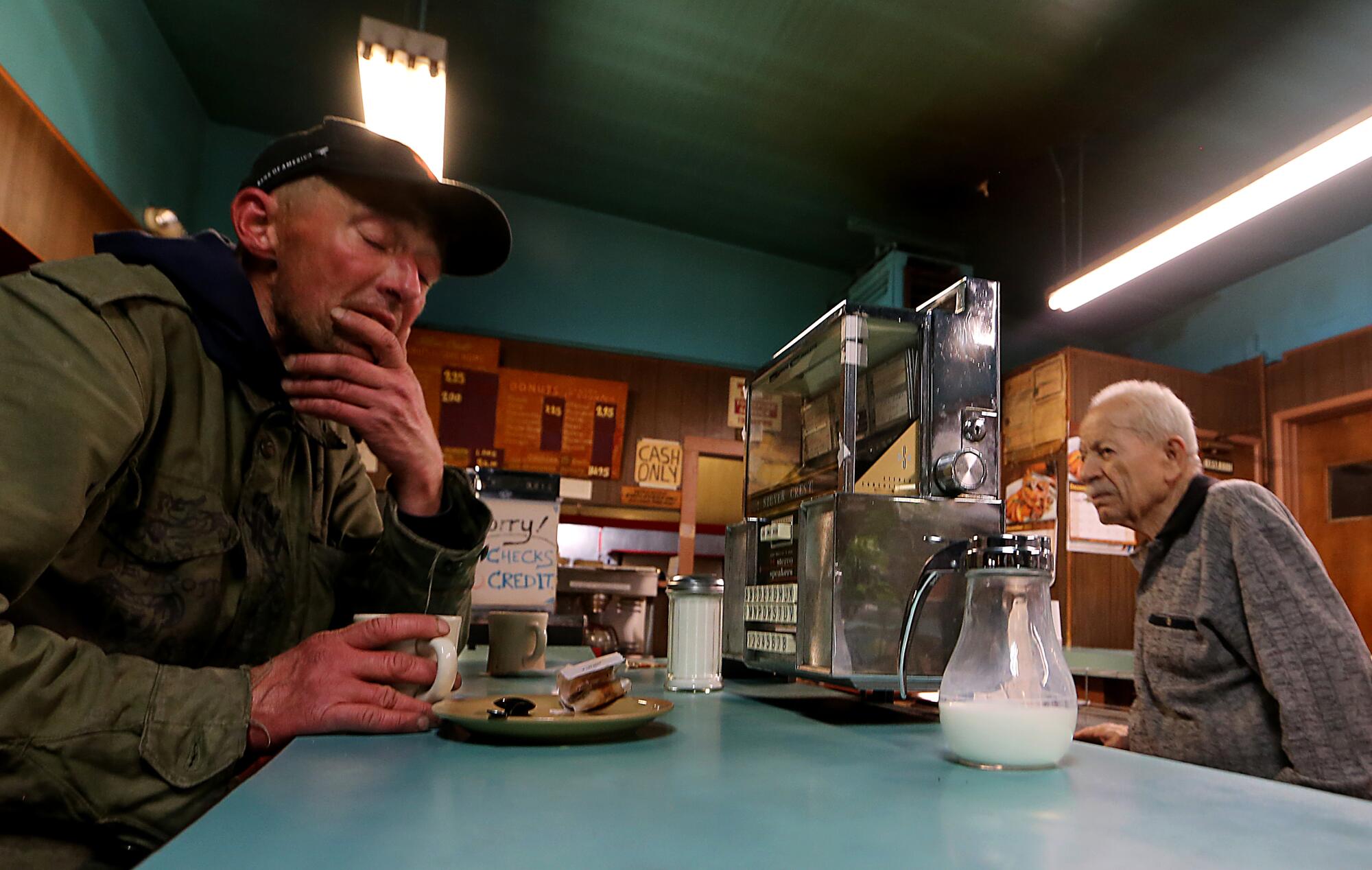
The story of the Silver Crest Diner begins with potatoes. George and Nina Giavris came to San Francisco in 1959 from a small, mountainous community in Greece, where they grew up farming for potatoes.
They arrived in the U.S. during a time when an audacious promise like “We never close” made sense.
Diners became a big business in the 1950s, emblematic of the postwar economic boom. Technological leaps in building, energy and materials science ushered in an era defined by what sociologist Alan Hess called a “euphoric optimism” about the future. Futuristic, imaginative coffee shops sprang up everywhere to serve a burgeoning car culture, offering a quiet oasis from the chaos of new freeways and roads.
When George and Nina took over the Silver Crest , they joined the many thousands of Greek immigrants who worked in diners and luncheonettes. Pamela doesn’t know the specifics of the purchase, and George doesn’t really want to talk about it. But everyone can tell that he and Nina loved the place. The diner had its own matchbooks, printed with the phrase “Your host: Georgios Giavris.”
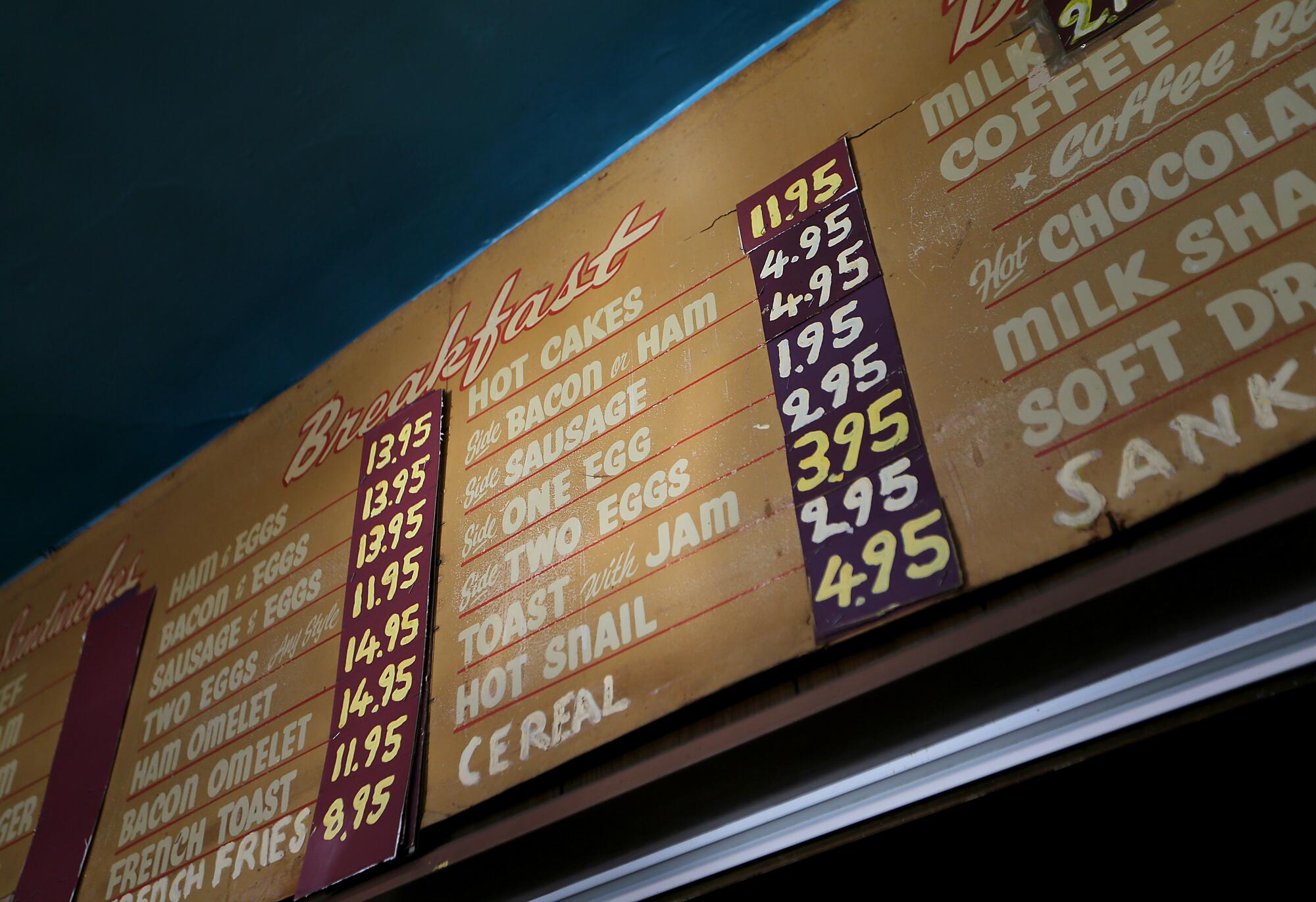
“He would tell the customers, look at this as your second home,” Pamela says. “‘You are my respected son,’ he’d say and hug them.”
At its heyday the Silver Crest had 20 employees. Now there are just five: George, Nina and Pamela, as well as a chef and a dishwasher.
After the clothing manufacturers left, the neighborhood saw more violent crime, George says. More recently, homeless encampments have sprung up near the freeway. But no one bothers George, Pamela says. People are glad he’s keeping the lights on.
“He’s going to go down with the ship,” says Rhoss Despanie, who describes himself as a DJ, but whose business card also identifies him as a Realtor.
Despanie has been coming to the restaurant since he was 18. While George has some cornflakes, no milk, and washes them down with coffee, Despanie recalls the time he saw someone get stabbed to death in the bar. And the party he threw that was inspired by the history of the Chitlin Circuit, music venues across the U.S. famous for hosting Black performers.
“We had an Aretha Franklin impersonator, a Barry White impersonator, one for Gladys Knight too!”
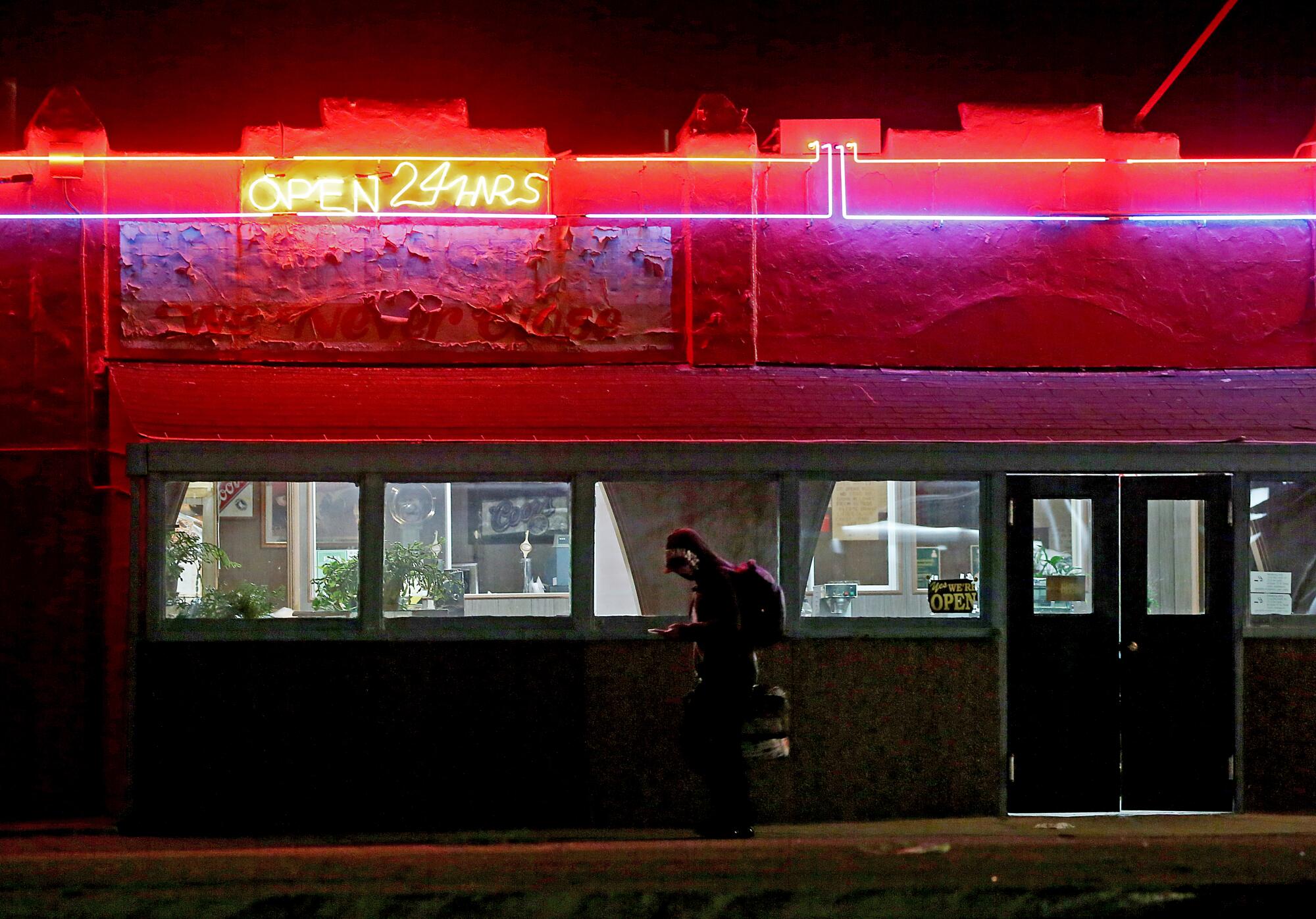
By 3 a.m. Despanie is gone and George is asleep in his chair. Pamela is telling me about the delicate web of relationships that keeps the restaurant running.
First, there’s Pamela, who works whenever George needs, the main enabler of his stubborn battle with time. It’s hard to hire anyone because the diner can’t afford to pay more than minimum wage, and no one wants to work for minimum wage anymore, she says.
Minimum wage in San Francisco is more than $18 an hour. She’s glad the law exists. But does higher pay mean that the diners will be full of dishwasher applications, Pamela wonders? Will a college graduate decide to work the swing shift, so she can see her husband for a few more hours a day?
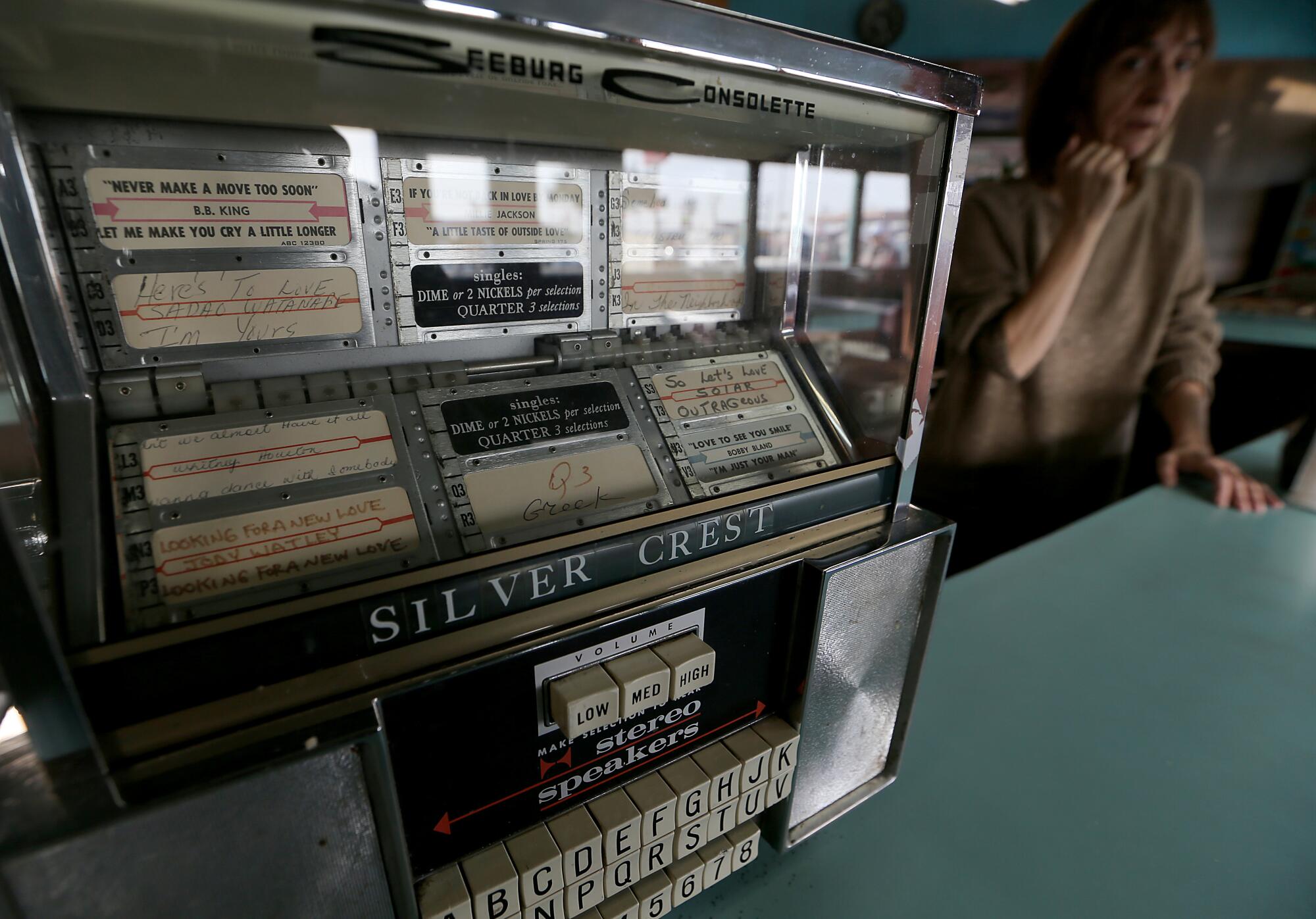
The coin-operated mini jukeboxes at each table still work, but they’re so old that George and Pamela know of only one mechanic who can repair them — and he recently moved to the Pacific Northwest. He‘s promised to fix the machines when he visits his family in the Bay Area, but it’s been a few years, Pamela says.
And then there’s George, who won’t close the restaurant even when there’s no one to cook. Who refuses to raise the prices or use a cellphone. Who tries to keep my cup of coffee topped off even though he can’t leave his chair, waving at me to bring my cup over.
“He loves it,” Pamela says. “This is the only place he is happy. You cannot take it away from him.”
Finish your potatoes, she says. She works hard on them. First, they’re steamed whole in batches, peeled, then refrigerated before they hit the grill with a generous amount of butter.
And finish your eggs. They come fresh from Petaluma Farms each week, and they aren’t cheap. My meal cost $13.95, exactly what the hand-painted letters on the menu board show.
I come back the next morning to find Pamela bantering with one of her regulars, Victor Cassar, who is also 84. George has gone home to sleep, and I’m relieved to discover that he does leave the restaurant occasionally.
A self-described hippie and former Hells Angel, Cassar has been eating here for 50 years, long before he became diabetic. Long after too. He lines up his medications on the counter in front of his plate of potatoes and eggs and downs them one by one, flirting shamelessly with Pamela the whole time.
“If I choke, you got to come over here and give me the Heimlich maneuver,” he says.
“I’ll let you die,” Pamela replies, rolling her eyes.
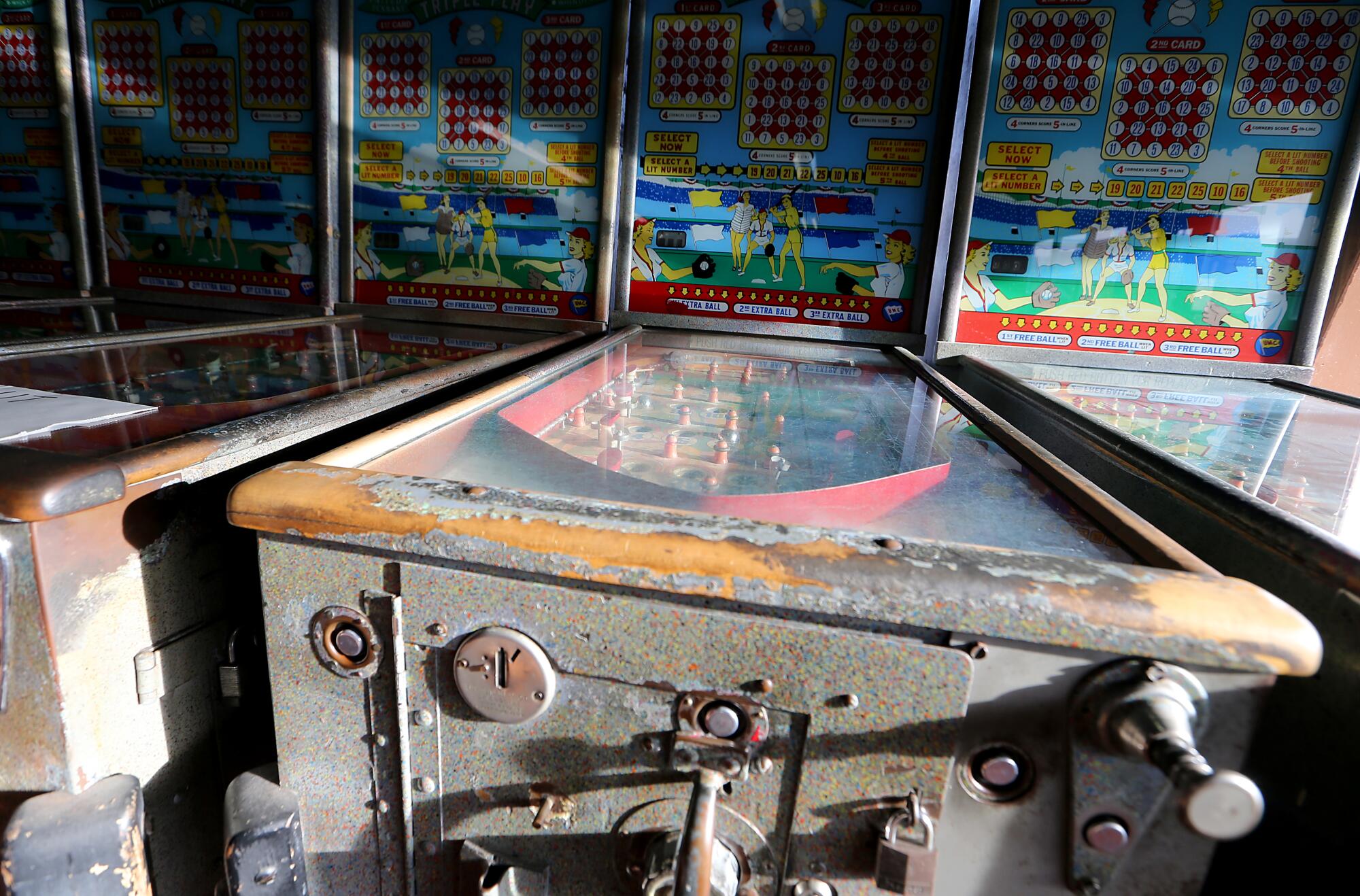
She coaxes him into taking his pills every morning, refuses to serve him processed sugar and scolds him for drinking coffee, which his doctor says he’s supposed to avoid. Sometimes, she’ll buy clothes for him or help him out in other ways. Cassar doesn’t have kids and isn’t married. She visited him in the hospital after his last motorcycle accident.
“He was there for months. All because he disobeyed me and wanted to get on that thing,” Pamela says.
“She knows more about me than I know about myself,” Cassar says.
I start to think about what this neighborhood might be like if the Silver Crest wasn’t open — if Pamela wasn’t there to remind Cassar to take his medications, to keep him off his motorcycle and tell him to avoid bacon. How many Victors and Pamelas have met each other in places like this?
The Silver Crest makes a quiet argument that being open is its own kind of public good.
Diners, coffee shops, libraries, churches and many other brick-and-mortar businesses serve an important human function by offering what sociologists call the “third place” — a venue for relationships outside of work and family, where imbalances in age and status are irrelevant.
I start to understand why George’s promise might be so important to him.
A few minutes after midnight on my last day at the Silver Crest, one of the bar patrons drops his quarter just right, and the old, temperamental jukebox in the back starts to play. It’s Bing Crosby’s “Anniversary Waltz.”
“Let this be the anthem
To our future years
Through millions of smiles
And a few little tears…”
Everybody cheers. George nearly smiles and pours me a shot of ouzo, a Greek aperitif flavored with star anise.
Leo Miller, the jukebox whisperer, has been coming to the diner since he was in elementary school. As a kid he came for the doughnuts, and as an adult he comes for the vibes — the diner’s lonely, retro style draws comparisons to “Twin Peaks” and David Lynch. Every time he comes in, he can’t believe it’s still open. Most of the 24-hour places he used to go to have closed.
“There’s a lot of desperate people in this city, and a late-night business … helps people get shelter and be warm,” Miller says. “Understandably, new businesses don’t really want to do that.”
I ask George when he’ll be ready to quit, and suddenly he starts talking.
“You never know what time and place you will die,” he says. “I follow the Greek philosophy: Any good that comes will come with bad. Any bad that comes will come with good. The time you have, enjoy it, and relax, and always prepare.”
He’s in a lot of pain these days, and it’s hard to keep things going, but he has good days too. He kept apologizing for not speaking English well. He was educated after the war, where there were no books, and everything had to be written on the blackboard.
“If I close, I’ll close forever. But I said we never close, so we never close. If you promise something you keep the promise. Or don’t promise,“ George says.
He pauses and encourages me to drink my ouzo.
“Maybe when I turn 149, then I will retire. That’ll be a good long time. Because, you know, nobody lives to 150.”
I laugh, in part at George’s joke and in part at myself. I had spent 24 hours here over the course of a week, and all I learned is what George told me on the first night: Promises are important, and his long vigil at the Silver Crest matters.
More to Read
Sign up for Essential California
The most important California stories and recommendations in your inbox every morning.
You may occasionally receive promotional content from the Los Angeles Times.












